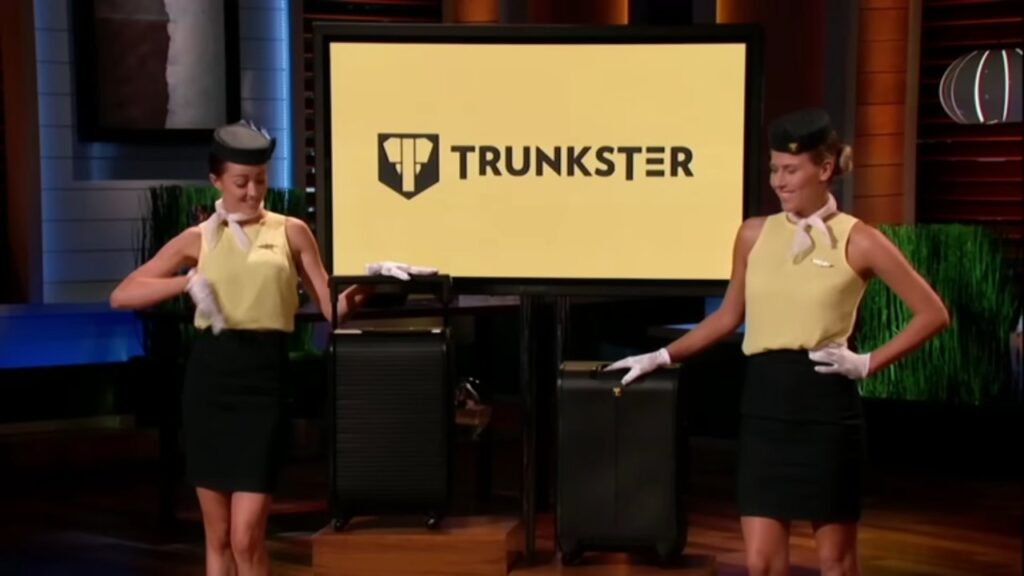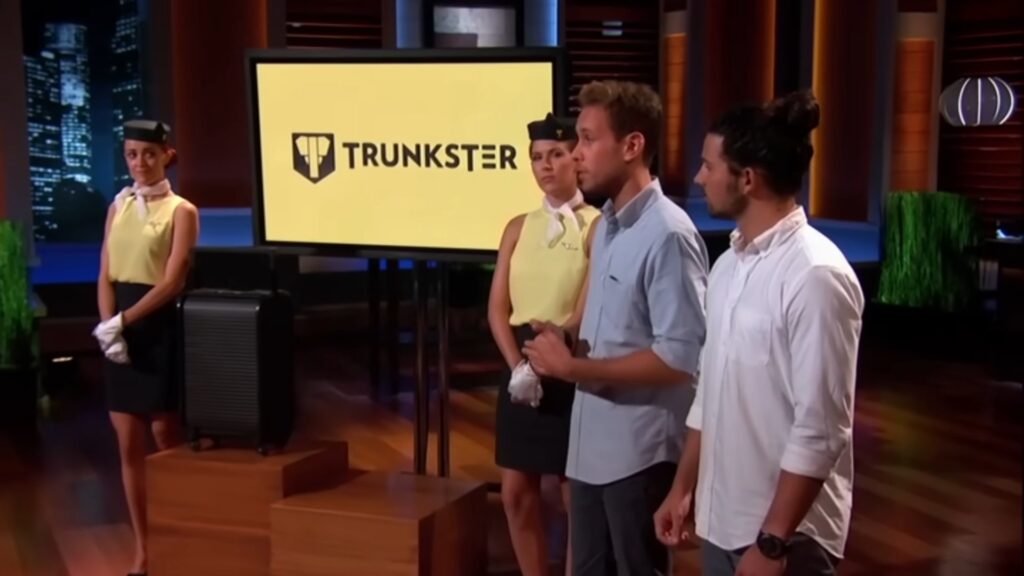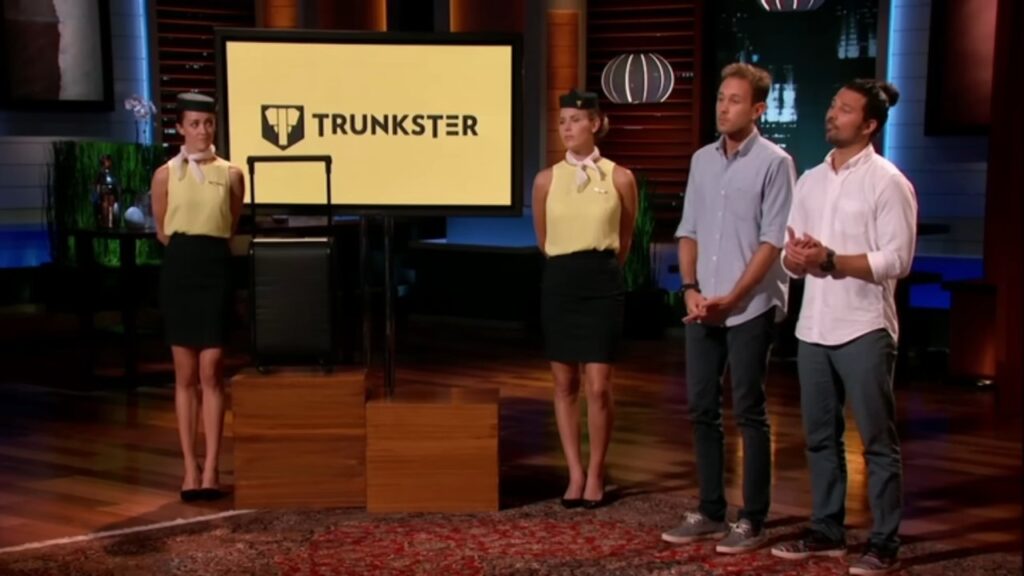Highlights
- Trunkster asked for $1.4 million for 5% equity, implying a valuation of $28 million.
- Trunkster secured an on-air deal with Mark Cuban and Lori Greiner for the same amount and terms.
- After the show, the company struggled: many backers claimed orders were never fulfilled and the company later closed.
When Jesse Potash and Gaston Blanchet rolled their zipper-free suitcase onto the Shark Tank stage in Season 7, the Sharks were instantly intrigued.
Trunkster, promised to reinvent travel with a sleek, tech-packed suitcase featuring a roll-top door, built-in scale, USB charging port, and GPS tracking. It wasn’t just another piece of luggage — it was billed as the “Tesla of suitcases.”
Despite securing an on-air deal and millions in pre-orders, Trunkster’s journey soon took a rough turn — marred by manufacturing delays, unhappy backers, and eventually radio silence.
Let’s unpack what really happened after Shark Tank, where the founders are now, and what lessons entrepreneurs can draw from Trunkster’s turbulent ride.
Trunkster Overview
| Field | Info |
| Company name | Trunkster |
| Founder(s) | Jesse Potash, Gaston Blanchet |
| Industry | Travel & luggage |
| Product name | Trunkster suitcase (roll-top smart luggage) |
| Episode aired | Season 7, Episode 10 (2015) |
| Asking | $1.4 million for 5% equity |
| Valuation | $28 million (implied) |
| Result | Deal announced ($1.4m for 5%) |
| Shark with deal | Mark Cuban & Lori Greiner |
Net Worth: How Much Is Trunkster Worth Today?
When Trunkster appeared on Shark Tank they implied a valuation of roughly $28 million ($1.4m for 5%). However, the company appears to have ceased operations and therefore has little to no active value.
The lack of viable product fulfilment, missing funds, and shutdown make the business effectively worthless from a going concern perspective.

Trunkster Shark Tank Pitch
Trunkster aimed to solve familiar travel annoyances: broken zippers, lack of charge points while travelling, overweight luggage surprises and untracked bags.
- Their solution: a suitcase that opens via roll-top (no zippers), includes a built-in scale to check weight, has USB ports for charging, and GPS tracking for lost bags.
- Their pitch was energetic and visually driven — showcasing the suitcase’s novel roll-top entry, tech features and premium materials.
- The Sharks’ first question was about how they justified the $28 million valuation when no units had been shipped
- They revealed about $2 million in pre-orders via Kickstarter/Indiegogo.
- They said they had yet to deliver manufacturing units, which raised risk alarm bells for the Sharks.
- They stated a retail price of around $395 for the unit, with cost roughly 20 % of retail.
- They claimed $2 million in pre-orders before appearing on the show.

Did Trunkster Get a Deal on Shark Tank?
Yes — on-screen the entrepreneurs accepted a deal with Mark Cuban and Lori Greiner: $1.4 million for 5% equity, with a contingency that if repayment isn’t made in 24 months their equity doubles to 10% and a $1 per unit royalty applies.
However — crucially — the deal never officially closed. Many sources report that the investment was not transferred and the Sharks did not finalise the legal paperwork.
What Happened to Trunkster After Shark Tank
Initially, the company enjoyed strong crowdfunding traction: their Kickstarter was reportedly one of the most-funded travel campaigns of its time. The Shark Tank exposure brought major visibility.
No substantial follow-on funding rounds or major retail partnerships are publicly documented. The fact the Sharks reportedly didn’t follow through suggests a lack of major backing.
Significant issues: manufacturing delays, supply-chain and fulfilment problems, many backers claiming they never got their orders, and critical reviews of those units that did arrive.
The official website became inactive; social-media accounts vanished; many customers reported non-receipt.
How Is Trunkster Doing Today?
- The brand appears to be defunct. The website no longer functions and public communications stopped around 2018.
- None credible post-show; the preorder figures were widely cited, but no verified ongoing operations.
- Founders have moved on: Gaston Blanchet co-founded Storypod; Jesse Potash reportedly took a role at another company.
Where to Buy Trunkster
Trunkster products are not available via direct website or major retailers.
The brand’s website is offline and no active retailer listing is found. As such, there are no valid purchasing links.
If you’re looking for alternatives in the smart luggage space, consider credible brands like Away and Samsonite.
Trunkster Competitors
- Away: a modern luggage brand known for strong D2C model, emotionally charged branding, straightforward features and strong fulfilment — positioning as premium but reliable.
- Samsonite: A long-standing legacy luggage brand (founded 1910) which has dabbled in “smart luggage” features (built-in tracking, digital scale, etc) and remains a dominant player
What made Trunkster unique: the roll-top zipperless design and integrated tech (scale, battery, GPS) all in one suitcase. But what it lacked was execution, credible manufacturing/fulfilment and scaling.
Lessons from Trunkster’s Shark Tank Journey
- A great idea and strong pitch are not enough — execution, product reliability and delivery matter critically.
- Crowdfunding success (pre-orders) can generate validation, but also magnify expectations and risk if you can’t deliver.
- High valuations without a track record invite scepticism — the Sharks pointed this out early.
- Brand trust is vital — failure to fulfil orders undermines credibility and can be fatal.
Trunkster Timeline Recap
- Late 2014 / early 2015: Kickstarter campaign (~$1.39 m) and Indiegogo (~$1.5 m) launched.
- 2015: Shark Tank appearance (Season 7, Ep 10) asking $1.4m for 5%.
- 2016 – 2017: Manufacturing delays, backer complaints.
- 2018: Company appears to wind down; website inactive.
Conclusion
Trunkster was a bold product concept with strong crowdfunding momentum, and the Shark Tank pitch created a lot of excitement. However, the lack of reliable manufacturing, fulfilment and business execution made the dream collapse.
While the Sharks seemed interested, the deal never closed and the company ultimately did not deliver on its promise.
For the founders, the journey ended with lessons learned. For entrepreneurs, the takeaway is clear: idea + press = potential, but delivery + trust = sustainability.
Related Posts:
